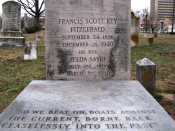Contending with the Past while Alluding to the Major Theme of the American Dream in F. Scott Fitzgerald's The Great Gatsby In F. Scott FitzgeraldÃÂs The Great Gatsby, the main character, Jay Gatsby, must contend with his past and the decisions he chooses during his life. Gatsby decides to pursue wealth and success in order to secure his love from Daisy. GatsbyÃÂs unsuccessful and corrupt pursuit of fortune and success connects to the theme of the novel: the corrupted nature of wealth brought by the ideal of the American Dream. Such ideal represents the opportunity to achieve prosperity and to be an individual without constraints imposed by society through the class system, race and ethnic discrimination, and the caste system. GatsbyÃÂs way of achieving wealth and success, which belittled his opportunity to have Daisy accept him as his true love, contributes to the meaning of the novel as a whole by alluding to the corrupted nature of wealth brought by the American Dream, which is the most prominent theme of the novel.
Gatsby was a poor soldier in love with Daisy FayÃÂa greedy and corrupted girl that married Tom Buchanan for money, instead of marrying Gatsby. When Daisy Fay married Tom Buchanan, Gatsby decided to pursue wealth and opulence through illegal activities, possibly bootlegging, in order to regain his love, Daisy. Gatsby achieved wealth in a short span of five years, becoming part of the group who had recently attained a vast quantity of money, consisting of individuals who showed off their wealth through ostentatious artifacts, cars, and clothing. His decision of pursuing money represents the American Dream, which stated that oneÃÂs prosperity and wealth depends only on oneÃÂs abilities and hard work, not on the rigid class structure that divides the wealthy, into the new money-holders, the old money-holders, and the poor. GatsbyÃÂs illegitimate manner of pursuing wealth, through his belief in the American Dream, for love represents the corrupted nature of wealth. This brought only one of GatsbyÃÂs desires, wealth, but did not suffice for the mutual love account from Daisy. Gatsby lost Daisy when Tom Buchanan told Daisy about GatsbyÃÂs illegal manners of attaining his wealth during the war. Through this, Daisy decides to remain with Tom, devastating Gatsby and perpetuating him to his past actions, and affecting his life. Even though Gatsby is annihilated, he must contend with the decision that Daisy made which was caused by the manner he attained his wealth.
Furthermore, GatsbyÃÂs past decisions contribute to the meaning of the novel as a whole, since they represent the corruption of wealth as a result of the American Dream. This ideal, which Gatsby pursues, was in a state of decline since hard work was becoming a non-essential factor, as demonstrated by GatsbyÃÂs illicit manner of achieving wealth such as alcohol bootlegging. The decline of the American Dream is also represented by GatsbyÃÂs death in the hands of Wilson, who, representing the poor, killed Gatsby thinking that he had been driving the car that killed his wife. GatsbyÃÂs death exemplifies the way through which the past will always follow Gatsby. The past is represented by WilsonÃÂs poorness, which in turn symbolizes GatsbyÃÂs previous financial and social status. His death also represents the metaphorical death of the American Dream caused by the corrupted nature of wealth. Wealth leads to a life of materialism and purposeless drifting because of the belief that if one owns money one can manipulate and dictate life in order to stay everlastingly youthful and acquire cheerfulness through materialist spending. This is the method though which Gatsby intends to live his life and buy his love from Daisy.
GatsbyÃÂs method of pursuing the American Dream through illegal activities demonstrates the corrupted nature of wealth. Gatsby must contend with his decision of achieving a wealthy status through illicit activities such as alcohol bootlegging, when Daisy decides that she will stay with Tom after Tom tells her about GatsbyÃÂs past. GatsbyÃÂs death represents the metaphorical death of the American dream, as well as the manner that Gatsby had to contend with his pastÃÂhis poornessÃÂand how his past will always follow him. GatsbyÃÂs way of life and method of intending to receive a mutual consensus of love through money, represent the corruptness of wealth.





